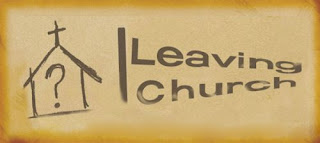How to Leave a Church
In the 16 years that I have been in full time local church ministry as a lead pastor, associate pastor, youth or children's pastor, I have seen a lot of people come and a lot of people go. Honestly in some exits I have rejoiced their leaving and prayed for the next church/pastor they will land at. In others it broke my heart to see them go. Of the ones I found most saddening and heartbreaking, they were always people I had let in to my very private circle of trust and considered very close friends. Their exits were for numerous reasons such as relocation, fall out from a disagreement with a fellow church member, or simply from a leading from God as an end to a season of their life. In all but one instance (a recent relocation) the leaving has left our relationship fractured and even non existent. Some of those relationships have since been restored but none are the way they once were.
I've really struggled at why that is. Maybe because in some way there is a feeling of rejection, like they're "breaking-up" with me for a new sexier version of my church or me. I can't see why they'd leave and they can't see why they'd stay. Whatever the long term ramifications are of leaving a church, I have discovered there are ways to leave that will lessen the trauma to everyone involved. Leaving a church is always difficult and there is no perfect way to do it, but there are some ways that are better and some ways that are worse.
Three words should guide your actions when leaving a church:
Leave quickly.
Leave quietly.
Leave graciously.
Quickly means when you leave, you leave. Drawing out your exit rarely makes things better. It doesn’t help to “sort of” leave a church. When the time comes to leave, make your exit and go your way.
Quietly means you don’t try to explain yourself to others. In my opinon, you don’t owe a long explanation to every person in the church. If you have certain responsibilities in the church, you should let the leaders know so they can make proper plans. And quietly means you don’t write letters or emails to the congregation or make a big announcement and you don’t try to explain yourself over and over again. That’s usually a big mistake. Sometimes people who leave a church try to control what other people say after they are gone. Forget about it. You can’t control what anyone says. Some people may be deeply hurt by your leaving. It may mean the end of some friendships. Certainly things will change. You can’t say, “I want to leave this church but I want all my relationships to stay the same.” I think you’ll find that some people relate to you primarily as a part of the church, and they won’t be able to have the same relationship with you when you are gone. You have to be willing to let that happen and not try to control things. Leaving means letting go.
Graciously means you refuse to speak bad of those who remain in the church. Look forward, not backward. Focus on your new church, not your old one. Think carefully before you speak about your former congregation. Don’t say anything that could be remotely construed as criticism. Even casual comments could stir up needless controversy.
In the end, Christ is Lord both of your former church and your new church. He loves both with an everlasting love. Those churches were both there before you came along and both will be there after you are off the scene. The church of Jesus is so much larger than anything we can imagine—and God’s work is far bigger than our limited vision.
When the time comes to leave, leave. Don’t hesitate and don’t be like Lot’s wife who looked back. You may not turn into a pillar of salt but looking back will do no good either. So leave with a good heart, trusting that the same Lord is Lord over both churches. He will care for both congregations and you. You can be sure of that.


Comments